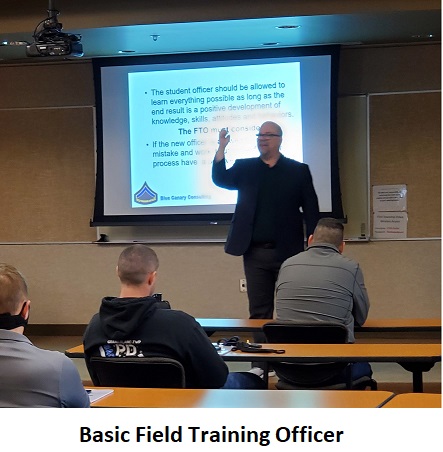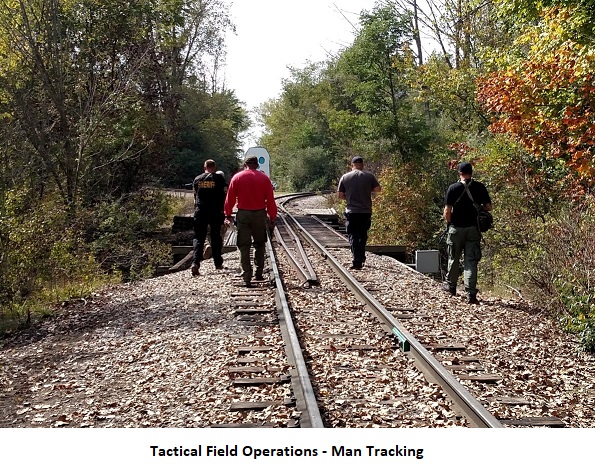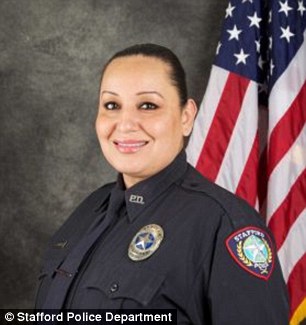This 4-day course is designed to provide knowledge and training to develop Field Training Officers’ skills. Each new FTO will be presented with ideas and techniques to assist them in becoming more professional and confident in the application of their skills. This course is based on a modified “San Jose” program. Upon completion the FTO will be able to:
- Discuss the “San Jose” and other program models
- Identify demands on FTOs as Instructors
- List five of the errors in rating
- Understand the basics of Adult Learning Theory
- Identify liability issues
- Understand performance evaluations
- Instruct from Training Briefs
- Understand the Rating Scale and Reference Numbers
- Complete the Daily Observation Report
- Develop a Scenario and additional Training Plans
- Understand the purpose of program management and control
Instructor: Steven Kellams of FTO Solutions. In 2000 Lieutenant Kellams was instrumental in redesigning the field training program for the Bloomington, Indiana Police Department and has taught that program to hundreds of departments throughout the United States. He has also instructed on field training issues at the national level when he presented courses at four National Association of Field Training Officers conferences, most recently in 2011. In 2005, Lieutenant Kellams was awarded the Law Enforcement Officer of the Year for Monroe County, IN for his work with the Bloomington Police Department’s Field Training Program. He was elected to the national NAFTO Executive Board and served as President in 2009.
Constitutional Use of Force
Legal to Reasonable Force Issues
This dynamic, one-day program is a reality-based course that separates fact from fiction about Case Law, The Use of Force, and Human Performance Under Stress. Focusing on Supreme Court decisions and applicable state statutes, this course strives to help limit your exposure to excessive and unnecessary uses of force and as a result, avoid litigation. From practical application on the street for line officers through force investigations, students will develop working knowledge of the constitutional parameters for using force. Scientific factors affecting human performance during dynamic force events will be examined as well as the impact of video on investigations and public perception.
Discover the Science of Police and Human Performance Under Stress. Using real incidents, you will learn the mind and body’s limitations and normal responses when using force. This course is constantly evolving and delivers video recorded current incidents, case studies, and small group discussion.
- Constitutional & Relevant Laws
- Use of Video Recording
- Excessive & Deadly Force
- Human Performance Factors
- Use of Force with Disabled Persons
- Electronic Control Weapons
- Report Writing
THE FIGHT AFTER THE FIGHT
It is a difficult time for the American police officer. A violent and aggressive emotional war is killing our officers in astounding numbers. Police survival has never been a more vital subject of training than it is today. Thus, training is increasing and evolving to better equip officers with the tools necessary for physical survival of deadly encounters/critical incidents, but is this enough? Officers are trained to win the fight in the arena of street survival, but they are not taught how to win the fight that comes AFTER that fight, which is often the most difficult part. We are failing here, and law enforcement suicide statistics are screaming this! Two of some of the most dangerous issues threatening our police officer’s safety is post-traumatic stress injury (PTSI) and the lack of knowledge on how to protect themselves from this injury. While this is a commonly known threat to the ranks of our law enforcement, it is still not a major area of focus for training.
The purpose of this presentation is to illustrate the importance of a survival mindset BEFORE, DURING and AFTER a critical incident. An officer may possess all the vital tactical training needed to survive a deadly attack; however, if they do not possess a well-trained survival mindset, chances of survival decrease significantly, both professionally and personally.
Officers will hear a powerful, gut wrenching, story that will challenge them to take an honest, hard look at their own mental toughness and will to survive. It will challenge them to ponder the tough question of “Am I truly prepared?” and provide them with the opportunity for survival against one of the most dangerous opponents they could ever face……. THEMSELVES.
The participants of this lecture will learn the importance of developing mental preparedness prior to a critical incident and ways to achieve this vital state of readiness /resilience. They will identify signs of post-traumatic stress, its effect on the brain, their physical/emotional wellness, and that of their family members and co-workers. Additionally, attendees develop strategies in obtaining/maintaining post-traumatic growth. They will discuss various methods of stress management and will be provided with the vital tools and resources needed to win in “the fight after the fight”, which is often the most difficult part of a critical incident.
Instructor: Ann M. Carrizales was born in San Clemente, California. In 1991, she enlisted in the United States Marine Corps where she was named an Honor Graduate and Meritoriously Promoted upon graduating boot camp in Parris Island, SC. After completing military law enforcement training, she began her Military Police career. While on active military duty, Officer Carrizales made Marine Corps history when she became the first woman to represent the Marine Corps in the sport of amateur boxing and was ultimately inducted into the All-Marine Boxing Hall of Fame.
In August of 2010, Officer Carrizales began employment with the Stafford (TX) Police Department. She played a vital role within her department serving as a Field Training Officer, R.A.D. (Rape Aggression Defense) Instructor and Police Instructor. Officer Carrizales also served on the East Fort Bend County Regional SWAT Team as a Crisis Negotiator. She was voted Officer of The Year two years in a row, an unprecedented achievement within the department.
On October 26, 2013, Officer Carrizales initiated a traffic stop on a vehicle occupied by three members of a violent gang known as MS-13. While speaking with the driver, a suspect opened fire, shooting her in the face and chest prior to fleeing. Carrizales immediately returned fire and while bleeding and in severe pain, got back into her patrol vehicle and began pursuit of the suspects. With the help of various police agencies and Houston Crime Stoppers, all three suspects were captured. (Dash cam: https://www.youtube.com/watch?v=bD7TGNjJA2I )
Female Enforcers
Advanced Mental, Physical and Tactical Skills
Female Enforcers is a one-day course specifically designed to address the 24/7 realities of law enforcement from a woman’s perspective. This inspiring seminar focuses on Gender Advantages and Disadvantages in the areas of Use of Force Encounters, Innate Instincts, Communication Skills, Physical Fitness, and Training Strategies.
This course is constantly evolving to incorporate the most current issues, events, and supporting materials for women looking to excel in their personal and professional lives.
Course discussions and topics include but are not limited to:
- Battling Bias and Misperceptions
- Honoring Trailblazers
- Tactics, Training, & Equipment for the Smaller Officer
- Use of force: Options and Differences
- Physical Fitness: Mind, Body, and Spirit
- Personal Well-Being and Healthy Relationships
- Advancing to the Next Level
- Being Authentic: Embracing Our Unique Strengths
- Perseverance, Persistence, & Resilience
- Mentoring and Leadership Among Female Officers
Win Grants for Your Agency
2 Days of Grant Writing Training for Public Safety Agencies
$3+ Billion FUNDING TRACK RECORD
The Law Enforcement Officers Regional Training Commission will host a 2-day specialized class for all Public Safety / First Responder Agencies on developing, writing, and applying for grant programs. The class will be presented by staff from First Responder Grants, (www.firstrespondergrants.com Participants will learn the skills needed to properly research, develop and apply to grant funding streams specific to Public Safety, Emergency Management and Homeland Defense.
The training is specifically directed at employees of First Responder and Public Safety Agencies of Police/Fire/EMS and Emergency Management or local government agencies seeking grant funding from Federal/State/Local grant funding sources.
Does this sound like your agency?
- Your agency lacks funds for vital equipment or training.
- You applied for grants in the past, but just can’t seem to get your application into the winner’s circle.
- Times are tight and your budget is shrinking, but grants seem so intimidating, you’ll never figure out how to get that crucial additional funding for your department.
- Need help finding grants?
You’re not the only one. Fire Departments, Law Enforcement Agencies, and other Emergency Services Agencies nationwide have felt the sting of the budget ax. Competition for grant funding awards is fierce. This training provides a competitive edge!
Don’t settle for another “Dear John” rejection notice. What did our clients do to avoid those rejection notices?
They got First Responder Grants training.
“We have been awarded $410,199, and we have about $4,000 invested in training and assistance through you. That’s over $100,000 for every $1,000 invested. Thank you.”
— Undersheriff Mickey Gruber, Brown County Sheriff, Kansas
In this economy, the competition for grant dollars will be extremely high. First Responder Grants Training gives you the competitive edge needed to win grants for your agency!
“Our department is very small and gets very little support from local government. Years ago, my department sent me to a First Responder Grants seminar in Philadelphia. It was the best money our department has ever spent. I would estimate in the last 3 years we are in the $750,000-$1,000,000-dollar club for grants. I would highly recommend going to this seminar.”
— Lieutenant Nick Cook, Bendersville Community Fire Co, Pennsylvania





